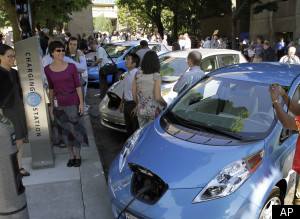
By Jonathan J. Cooper
Electric car drivers will get a charge out of a block-long stretch of a downtown Portland street that's been dubbed "Electric Avenue," and it may also help the automotive industry and others make important decisions as the use of electric cars evolves.
rtecenter”>
Seven electric charging stations from six different manufacturers have been installed at Portland State University as part of a two-year study that will examine which chargers get the most use, who's plugging in, and what they do while their car drinks up a charge.
The charging stations were unveiled on Tuesday in a ceremony that, naturally, featured the 1980s Eddy Grant song "Electric Avenue."
Drivers who rock down to Electric Avenue can charge up for free, as long as they pay standard street parking rates at the meter.
With electric vehicles just beginning to prowl American streets, researchers and industry officials hope the Portland project will fill in important blanks about how those vehicles are being used now and will be used in the future.
"The biggest unknown right now is driver behavior, and all the factors that go into what a driver is willing to do," said Shad Balch, a spokesman for General Motors, which makes the electric Chevrolet Volt. "All of these things will help drive what we do next as far as creating a market for electric vehicles."
A better understanding of driver habits will help engineers tailor the next-generation electric car to those needs, eliminating unneeded features and lowering the price, said Balch, who showed off a Volt plugged into one of the new Portland charging stations.
Electric Avenue has one quick-charge station that can juice-up an electric vehicle in about 30 minutes. The other six stations are called level two chargers and can fill up most batteries in four to six hours.
The machines will collect mechanical data, like when they're used and for how long.
Researchers also will survey users to collect other data, said George Beard, a Portland State instructor who is heavily involved in the project. Are they long-distance travellers pulling off of Interstate 5 for a quick fill up, or professors going to work? When the car charges, do they stand around and wait, or do they stop by the coffee shop across the street?
"We stand to learn a lot about the charging behavior of people who are driving these vehicles," Beard said.
So far, there are only about 400 electric vehicles on the road in Oregon, according to state officials, but they project that the number will grow rapidly. In his State of the Union address this year, President Barack Obama called for 1 million electric vehicles on the road by 2015.
To serve them, charging stations are popping up across the country.
Oregon and Washington are working on an initiative to install them along Interstate 5. By the end of the year, an electric vehicle should be able to travel the 580 miles from the southern border of Oregon all the way to Canada. Planners hope to eventually to extend the proposed West Coast Green Highway south to the Mexican border.
Electric vehicles will not put much strain on the power grid because charging stations don't use much of it – about the same as two hair dryers – and because most charging will probably be done from home at night, when plants generate excess electricity, said Jim Piro, president and chief executive of Portland General Electric, the local power company.
PGE is powering the charging stations with renewable energy. The utility will study their impact on the power grid, said Charlie Allcock, the director of economic development.
The gradual proliferation of plug-in vehicles, which accelerated with the release late last year of Chevy's Volt and Nissan's Leaf, is finally allowing the type of research Portland plans. Other vehicle manufacturers – including Ford, Honda and Mitsubishi – plan to release their own plug-in models by the end of next year.
"In the early stage of product development, we guessed at what the market would want," said Alan Bates, vice president of marketing at Portland-based Shorepower Technologies, which has installed charging stations since 2007. "We're now just finally seeing cars plug in."
Article courtesy of huffingtonpost.com

